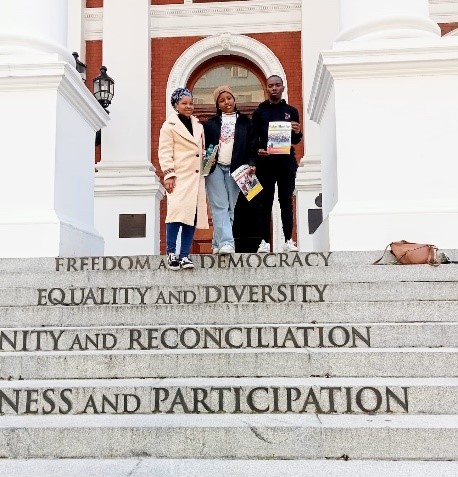During the month of August 2023, DVV International partner the Adult Learning Forum (ALF) joined a steering committee of stakeholders to prepare an event to commemorate Adult Learners’ Week (ALW) and International Literacy Day (ILD) during the month of September.
Some of the partner organisations included the Canon Collins Trust, Artscape theatre, the Public Education Office of Parliament, several Community Learning Centres (CLCs) and youth who are CLC student representatives.
This year's programme was held under the theme - Promoting literacy for a world in transition: Building the foundation for sustainable and peaceful societies. The event was hosted on the15 September which is International Day of Democracy while noting too that in South Africa Heritage Day is commemorated in the same month, on the 24 September.
The event was held in parliament and focused on various forms of learning - informal, non-formal, and formal learning. One of the speakers was Ashley Visagie who is a PhD student whose contribution at the event focused on the aspects and a critique of the militarised approach to discipline in some schools and the stigmatisation of poor young people in the efforts to create safer schools.
An input on Technical Vocational Education and Training (TVET) by another PhD student Helga Jansen who pointed to a more socially located and nuanced approach to skills development that considers and links with local economic conditions and Integrated Development Plans (IDPs) of local municipalities. Also, to re-imagine a more humane, deracialised and more equal economic system that helps to free the country from its past trappings in this regard.
Youth representatives from Adult Learning Forum who attended the dialogue spoke eloquently about their experiences in their respective communities and about the challenges that they face. Two former CLC students spoke about their current experiences in Further Education and Training (FET) colleges and how they feel discriminated against, were of the opinion that their CLCs qualifications are not valued in the same light as school certificates. They are nonetheless pursuing their studies in an anticipation of a qualification and work prospects that they hope will come from their academic efforts.
The two presentations that followed focused on Community Colleges were by the directors of Canon Collins Trust and DVV International (South Africa), Ivor Baatjes and Farrell Hunter respectively. Broadly, the presentations addressed the slow progress in implementing non-formal adult education within the Community Education and Training Colleges (CETC) responsible for adult education implementation.
The presentations also noted the irony of celebrating democracy when thirty years into South Africa’s democracy high levels of poverty continue to exist in the country with the highest inequality in the world. It was noted that many communities work at finding ways (and succeed) in ways to eke out a living often under very difficult social conditions.
The question was posited as to how community colleges and their CLCs can implement education programmes and approaches that respond to the precarious conditions that plague many youth and adults from impoverished communities.




